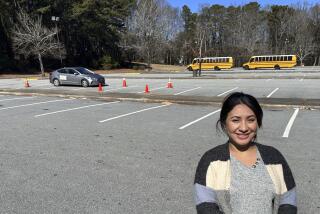Germany’s challenge: How will schools absorb thousands of Syrian children?
- Share via
reporting from Munich, Germany — To hear their Syrian parents tell it, Yasser and Taha, ages 6 and 9, were the driving force behind the family’s decision to make an arduous overland trek across half of Europe to reach safety in Germany.
“School for them, a good education — that is the most important thing there could ever be for me,” said the boys’ father, Zaid Taha, a businessman from the contested Syrian city of Aleppo. He led his family’s exodus after a barrel bomb fell near their home, killing next-door neighbors.
“Education, that’s their life,” he said, laying one hand on each boy’s head. “That’s my goal. That’s my heart.”
An enormous influx of migrants and refugees — 20,000 people crossing into Germany last weekend alone — comes only days before the Sept. 15 start of the new school year. And educators acknowledge it will be a struggle to accommodate the young arrivals, many of them disoriented and bewildered after a dangerous journey, and by the shocks of wartime life preceding it.
Syria’s ferocious four-year conflict has disrupted schooling for millions of children, and parents who are among the current wave of asylum seekers from there — many of them professionals from highly educated, middle-class backgrounds — are determined to make up for lost ground and lost time.
As the tide of migrants and refugees has moved north and west — on jam-packed trains and buses, at chaotic border crossings, in run-down hostels and in refugee-reception centers — the same refrain is heard over and over: Of everything a new life in Europe has to offer, education is the single most prized commodity.
With debate sharpening across Europe over the daunting burden of taking in so many people fleeing war and hardship, Germany’s public schools will become the proving ground in a vast social experiment. Some question whether the country’s educational system — highly regarded, but generally considered rigid in its practices and approach — will be nimble enough to adjust to rapidly changing needs posed by the influx, even though it has done so before.
In the German state of Bavaria, the initial entry point for most of the recent flood of arrivals, state law mandates that children of asylum seekers be enrolled in school. Because most newly arrived pupils would founder if placed directly in regular classes, public schools and private groups offer “transition” courses ranging from a few months to two years.
During such classes, students not only learn the German language but are also taught social customs that may be different than those they were raised with, such as boys and girls looking one another directly in the eye when speaking to one another.
Schools in Munich, Bavaria’s capital, will increase the number of transition courses by about 20% over last year’s, officials said, but no one knows whether that will be enough. If more are needed, the municipality will have to approve the hiring of more teachers, a sometimes time-consuming process.
The recent arrivals poured in so fast that officials are not even yet sure how many school-age children are among those who will be settled in the city under Germany’s complex distribution system for asylum seekers. They hope to have a rough count next week, before school starts.
Some refugee advocates say German authorities turned a blind eye to months of clear signs of the impending migrant crisis, squandering opportunities to prepare not only schools but also a range of social institutions.
“Politicians ignored it,” said Monika Steinhauser, head of the local branch of the Refugee Council, which works closely with municipal authorities. “We wondered: ‘Don’t they watch the news? Read newspapers?’”
Germany has absorbed waves of migrants before, from the Balkan wars and from its large-scale importation of Turkish labor.
Once at school, the youngest pupils — whether their native tongue is Arabic or Somali or Dari, the Persian variant spoken in much of Afghanistan — tend to pick up the German language very quickly, educators say. Some newly arrived first-graders can be placed in “mainstream” classes after only a brief adjustment period.
But that swift proficiency can carry a pitfall of its own, familiar to immigrant families everywhere: Sometimes even very small children find themselves the “managers” of their family, helping to navigate tasks such as doctors’ visits or filling out paperwork, according to refugee advocates.
Dealing with war-traumatized children has only recently become part of the academic curriculum in teachers colleges, said Michael Stenger, who heads a group that teaches vocational and job skills to migrant and refugee youths in their late teens and early 20s.
“A teacher might not understand why a child who was doing so well initially suddenly begins to struggle,” he said. “Their situation is very complicated.”
Success or failure in integrating school-age children into the social fabric will have profound repercussions for years to come, educators say. Although refugees’ day-to-day needs are overwhelming — food, shelter, medical care— refugee advocates said that if children thrive in school, it betters the family’s longer-term chances of finding its footing.
“The children first have to calm down and start feeling safe,” said Steinhauser, of the Refugee Council. “They need normality, and going to school is something that helps them feel that things are normal.”
Taha, the businessman from Aleppo, said that while his family was temporarily sheltering in Turkey, he began studying German using YouTube tutorials, and that his children, listening along, quickly surpassed him.
“Their minds are so fresh, so lively, so receptive,” he said. “They are like plants that must be watered with knowledge — but watered now.”
Follow @LauraKingLAT on Twitter
More to Read
Sign up for Essential California
The most important California stories and recommendations in your inbox every morning.
You may occasionally receive promotional content from the Los Angeles Times.










